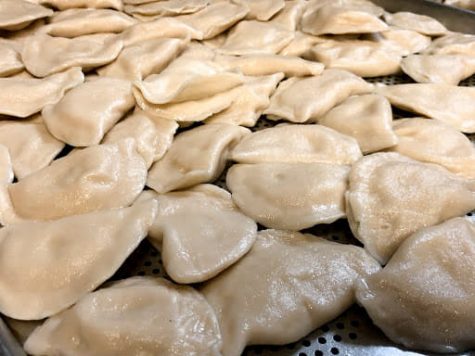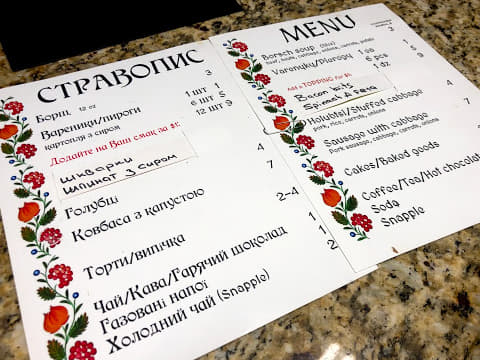Tucked away in an East Village basement, a handful of people sit around a long folding table — yellow plastic trays lightly dusted with flour sit in the middle, covered with circles of dough and mounds of potato-onion filling, some pleated into half-moon shapes, some still waiting to be assembled. From the outside, Streecha is easy to miss, identified only by a blue banner labeled in Cyrillic and a sheet of printer paper in English taped to a window.
“I can do this with my eyes closed,” Dmytro Kovalenko, Dima for short, said while folding dough in her hand. Kovalenko is the head of the kitchen at Streecha, a small Ukrainian restaurant created by and for the community that serves as a fundraising enterprise for the nearby St. George Ukrainian Catholic Church.
Every Friday morning from 7 a.m. to 11 a.m., volunteers gather here to make 1600 varenyky, a type of Ukrainian dumpling similar to pierogi, to serve throughout the following week. It’s a meticulous, almost meditative process.
Anastasiia Baram, who says she is 100 years old — “The oldest one here; oldest in Manhattan, probably” — comes to Streecha every week.
Oldest in Manhattan or not, she is spry and sharp-witted — she immigrated to the United States from Ukraine 57 years ago to escape the turmoil there, and for more than 37 of them, she’s been coming here to make varenyky.
“My mother taught us,” Baram said, pressing the seam of a varenyky shut. “She told us, ‘you should know.’ I taught my son as well.”
In the 50-plus years Streecha has been open, not much about it has changed. The menu certainly hasn’t — it’s a simple list of offerings: varenyky ($5 for six, and $9 for a dozen), borsch (the Slavic-to-English transliteration of the perhaps more familiar borscht — $3 for a bowl), stuffed cabbage ($4), sausage with cabbage ($7), an assortment of baked goods and a rotation of daily specials.

The Ukrainian community living in the East Village used to be larger, reaching a peak of around 60,000 after the post-World War II wave of immigration; but increasing rent, among other factors, has caused the population in Little Ukraine to shrink, according to the 2013 edition of the NYC Department of City Planning’s The Newest New Yorkers series. Most new immigrants now tend to settle in the outer boroughs, as 73 percent of foreign-born Ukrainian New Yorkers now live in Brooklyn. Members of the Ukrainian community still settled here are either aging — like Baram — or in their first, second or third generation. Nevertheless, St. George’s and Streecha remain epicenters for the community.
“You should see how many people here gather after mass on Sundays,” Kovalenko said. “There’s a line from the counter to the door, believe me.”
Though it can be stressful, Kovalenko cares deeply about what he does for his community here. A former businessman with a degree in finance, he is passionate about cooking.
“I like expressions of satisfied people when they have my food,” he said. “That’s the best reward for me.”
Later, after the hundreds of varenyky have been boiled and packaged, the long communal cafeteria-style tables rearranged and covered with decorative tablecloths, patrons begin trickling in.
“Streecha means you see people, come together, get new friends,” Baram said. More succinctly, as Kovalenko later adds, it means ‘gathering.’
As the aroma of deeply caramelized onions and fried potatoes fill the air, the buzz of conversation grows.
“Here you have Ukrainian culture, Ukrainian community,” Roman Mukha said over a bowl of Kovalenko’s borsch. Dark-haired and jovial, Mukha has been a regular patron at Streecha since moving to the United States in 2017.
“You come here and can talk to people, even if you don’t know each other,” Mukha says. An older man soon chimes in from across the room, and the two men banter animatedly back-and-forth in Ukrainian for a few minutes. Mukha later says the two had never met before.
“See?” Mukha said, turning back to his plate. “No one is a stranger here.”
Email Kylie Kirschner at [email protected].























































































































































